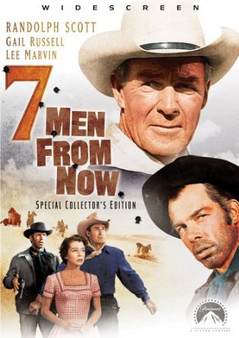Good for what it tells of the times, how a real man takes care of business
Reviewed by Brian R. Wright
But for one reason or another—friends tell me I’m missing some key gear teeth in the noodle—I had not remembered any of the Randolph Scott westerns. It was Mom who testified to the special suitability of Mr. Scott to the genre; then one night while I was over visiting, Turner Classic Movies came on with Robert Osborne hosting 7 Men and we watched it. (Then just the other day I ordered the DVD via Netflix, which more or less prompts this review.) What I recall from the original viewing is the film’s marvelous economy: the stoic, fluid efficiency of Ben Stride’s (Scott’s) actions and words as well as the “just the essentials” movement of the story.
Written by Burt Kennedy
Directed by Budd Boetticher
Randolph Scott … Ben Stride
Gail Russell … Annie Greer
Lee Marvin … Bill Masters
Walter Reed … John Greer
John Larch … Payte Bodeen
Stuart Whitman … Cavalry Lieutenant Coll
Interestingly, my own father back in the day before putting on some pounds bears a resemblance to Randolph Scott, who was 58 (my age now) when he performed this role. Scott really takes care of himself and looks 10-15 years younger. (It’s interesting to read up on the actor on IMDb; he strikes me as a man’s man, not full of himself or interested in the Hollywood-celebrity lifestyle.) And like my father in 1956, the Ben Stride character had definite views of what was manly and what was womanly, views most people today may look at as quaint if not misogynistic, such as:
- As a man you fail your woman if she has to work;
- If a woman works, she subjects herself to dangers and a man can’t protect her effectively
- A man is weak who can’t fight other men effectively to keep a woman’s virtue intact
- Women are naturally “objects of desire” and must not treat lightly or laxly this power they hold over men, especially they must not flaunt it to baser sorts of men[1]
Each one of these situations arises in 7 Men, or at least is implied. I just think it’s interesting to see these rather stark stereotypes articulated on screen with such moral conviction; the views are common currency in the 1950s. Stride is struggling with his own feelings of guilt for not measuring up back when he held the job of sheriff of Silver Springs, Arizona. We are introduced to him as a loner on a mission in rugged but not particularly hazardous Indian territory. He’s on the trail of (7) men who stole $20,000 from a Wells Fargo office. He soon runs into a young couple John and Annie Greer who are, initially literally, pushing a wagon to California to find their fortune.
Stride helps the Greers get unstuck then agrees to ride with them a bit. The plot thickens when Bill Masters (Lee Marvin) and a sidekick show up feigning interest in helping Stride to go after the thieves. Marvin plays sort of a “good” bad guy, constantly challenging the Randolph Scott character, who had previously sent Masters to jail. Masters also leers after the woman and has a classic scene where he more or less verbally rapes her and rubs her husband’s nose in it. It’s nightfall, everyone is inside out of the rain, and the camera works its magic capturing the reaction of Stride and the Greers to Masters’ lustful, contemptuous words offered with a menacing grin.
The DVD comes with a lot of cool features, including comments from directors Clint Eastwood (Unforgiven) and Quentin Tarantino (Kill Bill). These two comment on the visual style of director Budd Boetticher, who is quite the American original. Boetticher is one of the few directors, well probably the only one, who after graduating from college traveled to Mexico to actually become a bullfighter. Thus, it can be safely stated he is one of the few directors who lived the sort of life he created on the silver screen. He was considered a maverick, often butting heads with studio executives who tended to shy away from harsh authenticity. Boetticher’s other five westerns with Scott are The Tall T (1957), Decision at Sundown (1957), Buchanan Rides Alone (1958), Ride Lonesome (1959), and Comanche Station (1960), Sadly none of them is available on DVD yet (but you can go to the linked Amazon site and put your name on a list to be notified when they crop up).
I’ve seen some other non-Boetticher Randolph Scott westerns such as Ride the High Country (directed by Sam Peckinpah), and while for the most part they were box office hits, to me they just don’t have the reality and the impact of 7 Men. They seem too mired in the cliches of the ordinary commercial western of the time—too corny and staged, too much makeup. I’m interested to check out the other Boetticher-Scott collaborations, because I’ll bet they stand the test of time.
Speaking of makeup and conventions, even Boetticher can’t conceal the fact his actors are living in the 1950s and 1960s. In 7 Men, for example, Gail Russell is wearing red lipstick in her scenes and I’m pretty sure she has some eyeliner treatment going. At least Boetticher’s costume designers forego the pushout bras.
So if you’re thinking western this weekend and you have a hankering for the genuine article, put yourself in the throwback machine and watch a master—well two masters: Boetticher and Scott—at work. 7 Men from Now will impress and entertain you. It’s also not bad discussion material to bring up at your next feminism sensitivity gathering.
###
[1]A later master of the western, director Sam Peckinpah, makes this latter point about women being sexually irresponsible (comparable to male cowardice) effectively in the movie Straw Dogs, starring Dustin Hoffman and Susan George.
This post has been read 1168 times!


